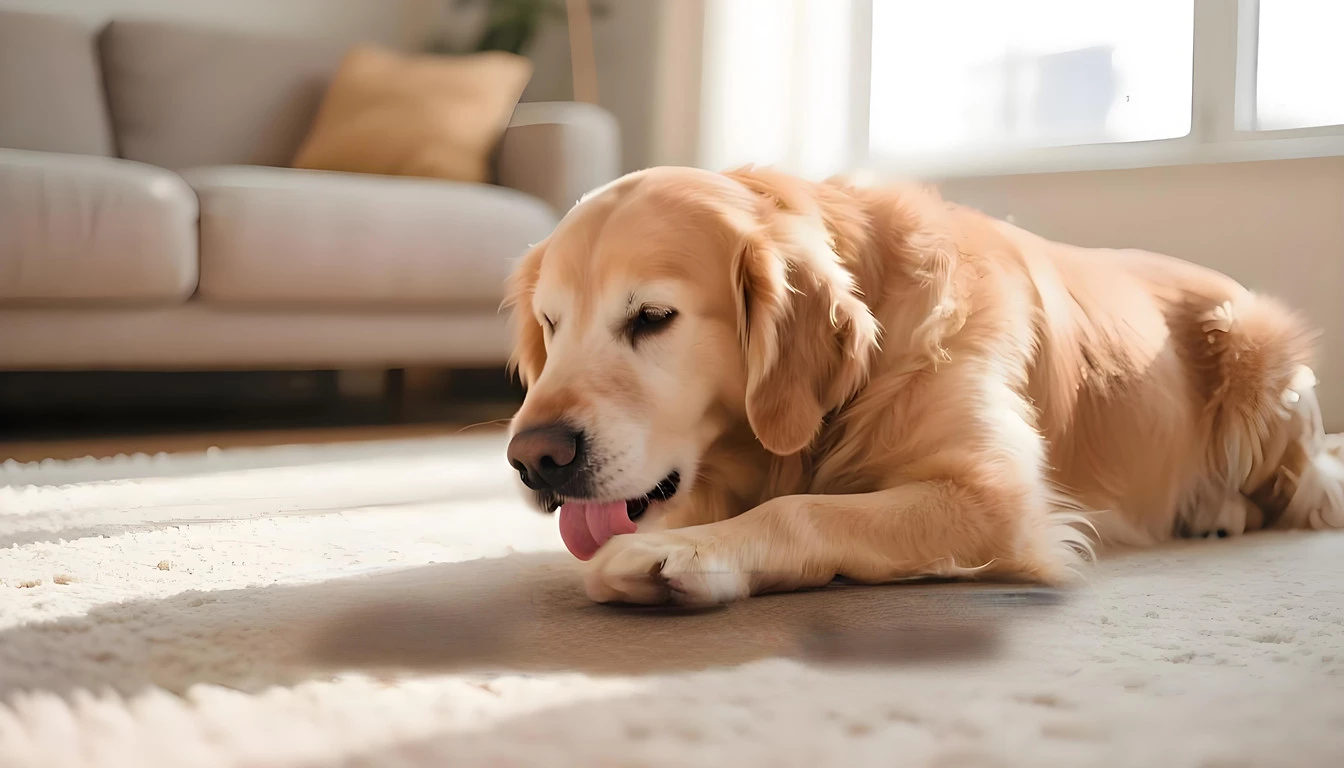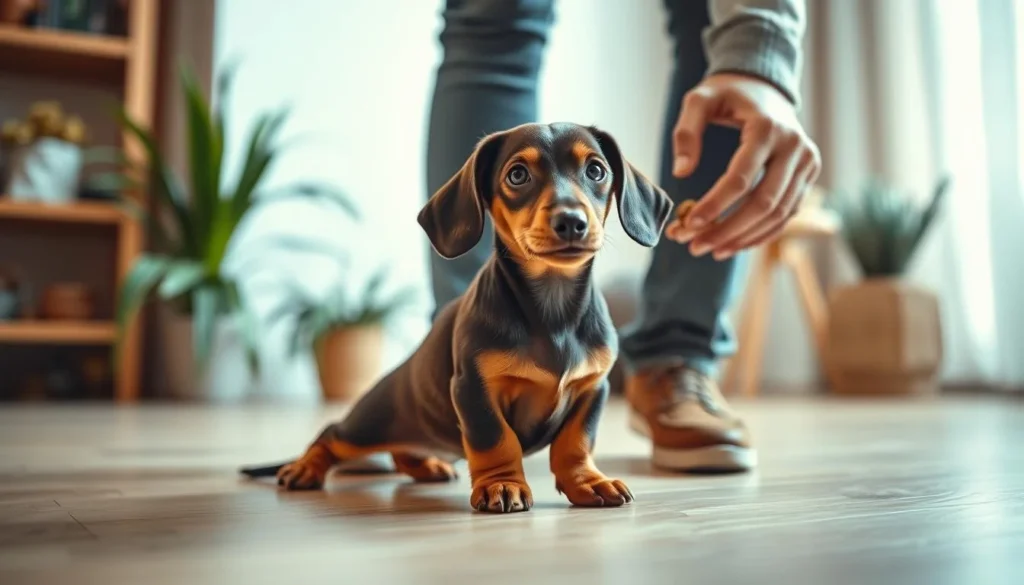Every time I see my dog, Max, licking his paws, it worries me. It's not just grooming; there's something more going on. Watching a pet struggle with this habit is tough. It can lead to infections or discomfort.
If you're facing this too, know you're not alone. Many dog owners wonder how to stop this habit. Luckily, I've found ways to help our pets feel better.
Key Takeaways
- Understanding the root causes of excessive paw licking is essential.
- There are both medical and behavioral approaches to address this habit.
- Regular grooming and monitoring can help prevent excessive licking.
- Providing mental and physical stimulation can reduce boredom and stress.
- Consultations with veterinarians or behaviorists can provide tailored solutions.
Understanding Excessive Paw Licking in Dogs
Seeing my dog lick his paws too much worries me. I always wonder why he does it. It's important to know that normal licking is okay, but too much needs attention.
Excessive licking might mean my dog has allergies, injuries, or is stressed. I've seen how normal licking can turn into a compulsive habit. This can make my dog uncomfortable and even harm his health. So, it's crucial to figure out what causes my dog to lick his paws excessively.
Knowing why my dog licks his paws so much is the first step to solving the problem. By paying close attention, I can spot the reasons or underlying issues. This helps keep my dog healthy and happy.
Common Causes of Dog Paw Licking
Understanding why dogs lick their paws is key to solving the problem. I often see my dog licking too much, and finding the causes of dog licking paws is crucial. Many things can cause this behavior, and knowing what they are helps find the right solution.
Injuries or Pain
If my dog licks his tail raw, it might be because of an injury or pain. Dogs lick to soothe themselves when they're uncomfortable. Looking for cuts, bites, or other injuries is important. If the licking doesn't stop, I might need to take my dog to the vet.
Allergies: Environmental and Food
Allergies can make a dog's skin itchy and irritated, leading to excessive licking. Things like pollen or dust can be allergens, as well as certain foods. If my dog's licking starts when they eat something new or when the seasons change, it could be an allergy. Spotting these patterns helps me figure out how to stop the licking.
Parasites: Fleas and Ticks
Fleas and ticks can make dogs itchy and uncomfortable. Regular checks for these pests help keep my dog happy. If my dog has fleas or ticks, they might lick their paws a lot to try to stop the itch. Using treatments to prevent parasites is important.
Behavioral Issues: Stress and Boredom
Stress and boredom can also make dogs lick their paws. They might lick to calm down when they're anxious or not getting enough to do. Keeping my dog busy and providing a stable routine can help reduce this behavior. Knowing when it happens helps me manage it better.
| Cause | Description | Signs |
|---|---|---|
| Injuries or Pain | Licking due to specific injuries or discomfort. | Localized licking, signs of pain at touch. |
| Allergies | Environmental or food-related allergies leading to itchiness. | Excessive scratching or licking, redness. |
| Parasites | Infestations of fleas or ticks causing itching. | Visible fleas/ticks, scratching. |
| Behavioral Issues | Stress or boredom leading to compulsive licking. | Paw licking during quiet or idle moments. |
The Cycle of Compulsive Licking
Understanding the cycle of compulsive licking in dogs is key to solving the problem. When a dog starts licking its paws too much, it can get a lick granuloma. This makes the problem worse and harder for owners to stop.
What is a Lick Granuloma?
A lick granuloma is a sore that forms from too much licking on the skin. The skin gets irritated and inflamed from the constant moisture and friction. This irritation can make the dog lick even more, starting a harmful cycle. It's important to understand this behavior and break the habit to help the skin heal.
How Licking Becomes a Habit
When a dog starts licking its paws, it might be because of discomfort or boredom. I've noticed that my dog licks more when stressed or anxious. Over time, this can turn into a hard habit to break. To stop a dog from licking its paws, it's crucial to know what triggers the behavior and how to manage it.
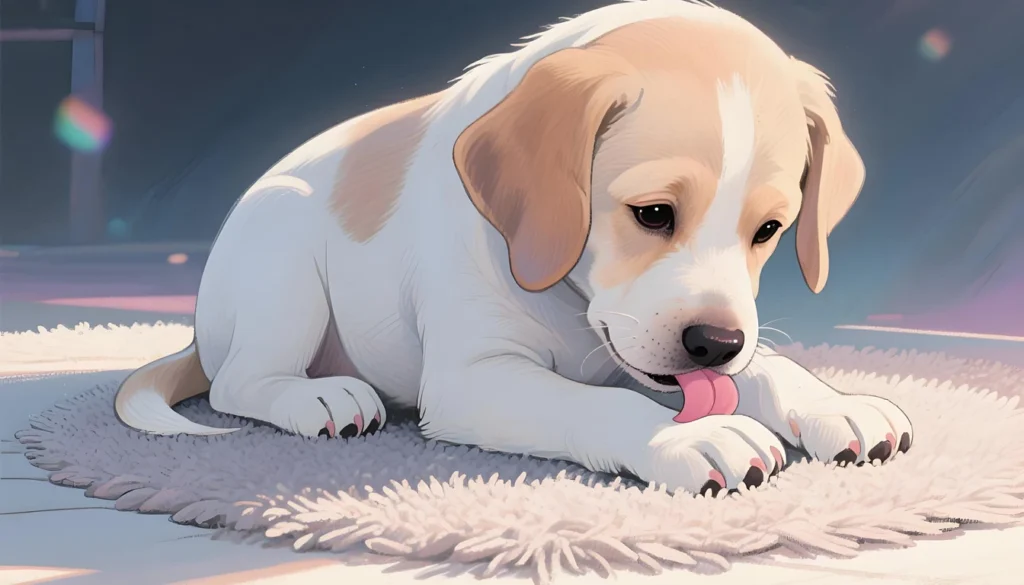
How to Get a Dog to Stop Licking Their Paws
Understanding why dogs lick their paws is key to solving the problem. There are many ways to stop this behavior. One method is to distract my dog with play or puzzle toys. This keeps her mind off licking.
Creating a routine is also important. Regular walks, meals, and playtime make my dog feel secure. This reduces stress licking. Also, knowing what triggers the licking helps me make changes to stop it.
Positive reinforcement works well too. Praising my dog for not licking her paws encourages good behavior. These strategies not only change her behavior but also strengthen our bond, making her happier.
| Technique | Description | Benefits |
|---|---|---|
| Distraction Methods | Engage with toys or games | Keeps the dog mentally stimulated, reduces licking |
| Consistent Routine | Set regular schedules for meals and play | Creates security and comfort, minimizing stress |
| Identifying Triggers | Monitor and adjust to known allergens or stressors | Lessens irritation, leading to reduced licking |
| Positive Reinforcement | Praise and reward for not licking | Encourages good behavior through positive experiences |
Medical Solutions for Paw Licking Problems
When my dog licks his paws too much, I know it's time to see a vet. Getting a vet's help is key to solving the problem. They can find out why my dog is licking and suggest the best ways to stop it.
Consulting Your Veterinarian
At the vet's office, I share all about my dog's licking. The vet will check my dog carefully to find any health issues. They'll also ask about my dog's food, where they live, and any changes in behavior. This helps them figure out the best treatment.
Medications and Treatments
My vet might suggest medicines to help with the licking. Topical creams can soothe the skin, and pills can help with itching and swelling. By following the vet's plan, I can help my dog feel better.
Preventive Measures for Dog Paw Licking
Stopping excessive paw licking starts with a proactive approach. Regular grooming and watching their environment can help a lot. This way, I can lower the risk of my dog licking their paws too much.
Regular Grooming and Cleaning
Grooming is key for a dog's health. It keeps their coat clean and lets me check for irritation or infection. During grooming, I:
- Brush their coat to remove dirt and debris.
- Inspect paws for any cuts or foreign objects.
- Trim the fur around the paws to reduce allergen trapping.
Monitoring Your Dog’s Environment
I watch my dog's environment to avoid allergens or irritants. Here's how I do it:
- Keep indoor spaces clean and free of dust and pollen.
- Avoid known allergens, such as certain plants or chemicals.
- Provide a comfortable space for relaxation to reduce stress-related licking.
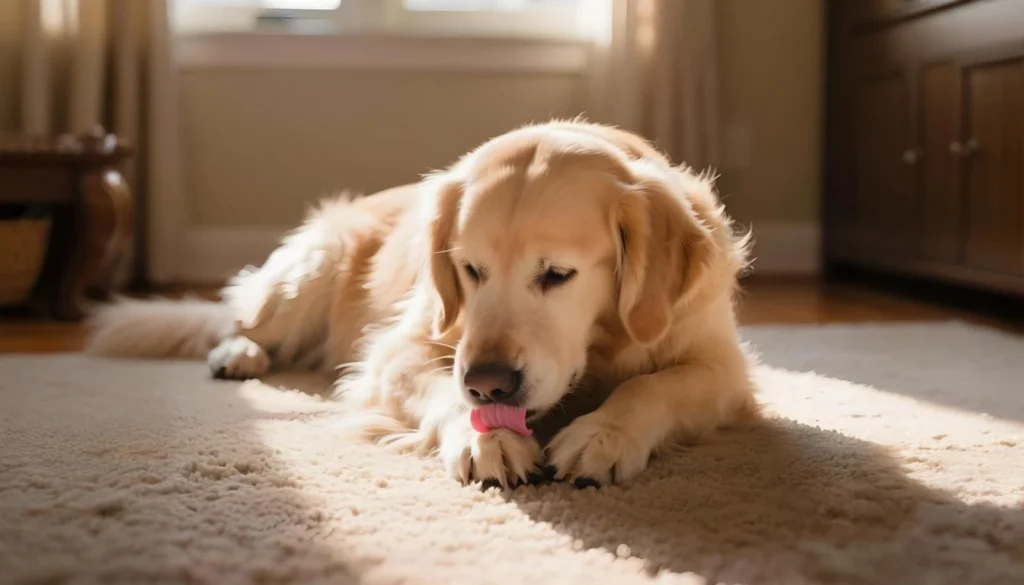
Improving Your Dog's Diet
Changing my dog's diet is key to better health and less licking. Quality ingredients and balanced nutrition help fix allergies or nutritional gaps. I always talk to my vet to make sure the changes are right for my dog.
Adding lean proteins, healthy fats, and fresh veggies is good for my dog. A healthy diet brings many benefits, like:
- Less skin irritations and allergies.
- Healthier digestion and gut.
- Stronger immune system.
By improving my dog's diet to prevent licking, their behavior and happiness get better. It's important to watch for any changes. If licking doesn't stop, I look into other reasons.
I also add supplements like omega-3 fatty acids for skin health. These reduce inflammation and keep my dog's skin and coat healthy. With these diet changes and vet visits, I learn how to get my dog to stop licking their paws well.
Providing Mental and Physical Stimulation
To stop dog licking paws behavior, it's key to give dogs enough mental and physical activity. Dogs that don't get enough exercise might start licking too much because they're bored. Keeping them busy helps reduce their paw licking.
Activities like walks, playtime, and training sessions meet their needs. A tired dog is less likely to lick. Puzzle toys and games also keep their minds active, taking their focus off their paws.
Spending time with my dog through different activities makes their life better and strengthens our bond. I make sure to prioritize these moments. They help a lot in stopping unwanted behavior.
Using Physical Barriers
When my dog wants to lick too much, I try using physical barriers. Dog booties and Elizabethan collars are good temporary fixes. They help while I figure out why my dog is licking so much.
Dog Booties and Socks
Dog booties are a simple way to protect my dog's paws. They block their paws from getting too irritated. This lets any rashes or injuries heal on their own.
There are many styles and sizes of booties. So, I can always find the perfect fit for my dog.
Elizabethan Collars as a Temporary Solution
Elizabethan collars are also helpful. They stop my dog from licking their paws. It might take some time for them to get used to it.
But, it gives me peace of mind. It helps my dog avoid licking when they're recovering from injuries or skin problems.
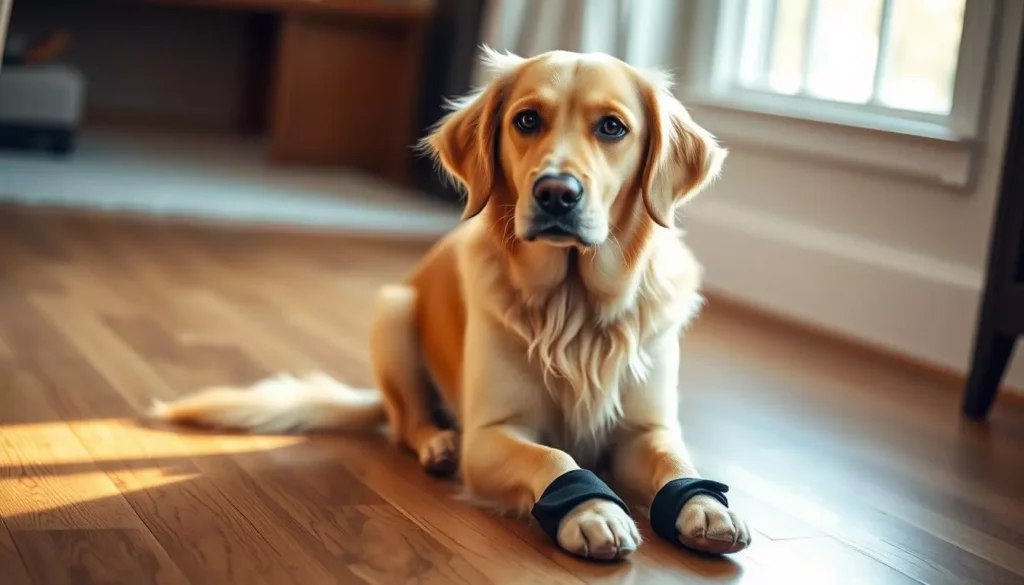
Natural Remedies and Home Treatments
When my dog licks his paws, I look for natural solutions. These options are kinder than harsh chemicals. Simple kitchen items can help soothe my dog's skin.
Coconut oil is a favorite of mine. It fights inflammation and moisturizes dry paws. A thin layer helps heal and protect. Aloe vera gel is also great. It soothes and calms the skin, making my dog more comfortable.
Another good idea is a paw soak with warm water and Epsom salt. Soaking for a few minutes a day cleanses and comforts. It stops my dog from licking too much. Learning how to use these home treatments makes life better for both of us.
Always check with a vet before trying new remedies. They ensure they're safe and right for my dog. Using these remedies with care can greatly improve my dog's life and cut down on licking.
| Natural Remedy | Benefit | Application |
|---|---|---|
| Coconut Oil | Moisturizes and heals skin | Apply a thin layer directly to the paws |
| Aloe Vera Gel | Soothes irritation | Spread a small amount on affected areas |
| Epsom Salt Soak | Clears and cleanses paws | Soak for 5-10 minutes in warm water |
Behavior Modification Techniques
Behavior modification is key for dogs with excessive licking. It helps reduce unwanted behaviors. Training needs creativity and patience, focusing on redirecting attention and using positive reinforcement.
Redirecting Attention
Redirecting your dog's attention is a great method. Engage them in activities that interest them. This can shift their focus away from licking.
- Interactive toys
- Fetch games
- Training sessions with new commands
Introducing these distractions has improved my dog's behavior. Keeping their mind active makes a big difference.
Training Techniques to Discourage Licking
Structured training techniques help reduce licking. Consistent commands and rewards teach dogs good behaviors. When my dog doesn't lick, I praise and treat them right away.
This creates a positive link to not licking. Over time, these behaviors become second nature. This leads to a happier, healthier dog.
Addressing Underlying Medical Conditions
It's key to find and fix health problems that make dogs lick too much. Issues like arthritis or skin problems can cause this. Knowing it's a sign of pain helps me help my dog more.
For example, allergies can make dogs itch, leading to more licking. They lick to feel better.
Regular vet visits are important to catch these health issues early. Keeping up with shots and prevention helps a lot. When health problems do come up, they affect my dog's life and lead to licking.
Handling Allergies and Irritants
It's key to know what makes your dog lick more. Many things in your home can cause this, like cleaning products, some foods, and plants. Finding out what these are can help you manage your dog's comfort better.
Start by watching how your dog acts. Notice when they lick more. Is it after being near certain plants or after you use a new cleaner? Keeping a diary can help you understand what's causing it.
To lessen your dog's discomfort, try a few things:
- Wash your dog's bedding often to get rid of dust mites and pollen.
- Use cleaners that are safe for dogs in your home.
- Make a special area in your house that's free from allergens.
For outdoor allergens, rinse your dog's paws after walks. This can help remove irritants. Regular grooming also keeps their coat clean and reduces licking.
The Importance of a Consistent Routine
Creating a routine is key for my dog's happiness. It makes them feel secure and less anxious. Knowing when to eat, walk, and play helps them behave better.
Keeping a regular care schedule is good for my dog's health. It keeps them busy and stops them from licking their paws too much. A daily routine keeps my dog calm and joyful.
I add different activities to our daily life. We have training, playdates, and walks. This balance makes my dog happy and well-behaved.
| Routine Activity | Benefits |
|---|---|
| Feeding Schedule | Promotes digestive health and stability |
| Daily Walks | Provides physical exercise and mental stimulation |
| Training Sessions | Enhances obedience and strengthens bond |
| Playtime | Relieves stress and fosters socialization |
A good daily routine makes my dog happy and healthy. Keeping a consistent care schedule helps avoid bad habits. It makes my dog's life richer.
How to Calm an Anxious Dog
Understanding your dog's needs and behaviors is key to calming them. Create a safe and comforting space for your dog. This can greatly reduce their anxiety. Using anxiety wraps or vests can offer a gentle hug-like pressure, helping them relax.
Pheromone diffusers are also effective. They release calming scents that mimic a mother dog's pheromones. Adding calming music to their routine can also comfort them. Try different sounds to find what works best for your dog.
Try arranging playdates with friendly dogs to help reduce anxiety. Daily walks or simple games can distract them from their worries. These activities also strengthen your bond with your dog.
| Technique | Description | Benefits |
|---|---|---|
| Anxiety Wraps | Wraps provide gentle pressure, delivering comfort. | Helps reduce stress and fosters calmness. |
| Pheromone Diffusers | Releases calming scents to soothe the dog. | Creates a peaceful environment. |
| Calming Music | Soft music designed for dogs promotes relaxation. | Reduces anxiety levels substantially. |
| Social Interaction | Engages your dog with other animals. | Alleviates loneliness and anxiety. |
| Routine Activities | Establishing daily routines for exercise and play. | Provides stability and predictability, fostering a sense of security. |
Consulting with a Behaviorist
If your dog keeps licking their paws, getting help from a behaviorist might be a good idea. These experts know a lot about dog behavior. They can figure out what's going on and suggest ways to help.
Behaviorists look at your dog's surroundings and past to find out why they lick. They might find that it's because of stress, boredom, or health problems. They then create plans to change your dog's behavior for the better.
Working with a behaviorist also means getting tips on training. They show you how to teach your dog new behaviors. This helps your dog find better ways to deal with stress and boredom.
Conclusion
Learning how to stop my dog from licking their paws has been a journey. I've found that it's not just about the licking itself. It's about understanding why they do it, like allergies or injuries.
By knowing the reasons, I can take better care of my dog. This means fixing the problem, not just treating the symptoms. It's a big step towards a healthier life for them.
Preventing paw licking has become easier with regular grooming and a clean home. Watching my dog's health and mood closely is also key. Giving them a routine and plenty of playtime has helped a lot.
Stopping my dog from licking their paws is a long-term effort. But with patience and the right steps, I'm confident they'll be happier and healthier. They'll live without the constant urge to lick their paws.

